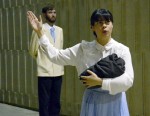Post World War II, Spain is still under the fascist dictatorship of Francisco Franco. And apparently everyone’s speaking Shakespearean English as well.
Shakespeare at UCLA is putting on its spring quarter production “The Winter’s Tale,” one of Shakespeare’s late plays. This is the directorial debut of fourth-year English student Laura Estrada, and although she’s sticking to the original dialogue and story, her production will be set in 1960s Francoist Spain.
Franco ruled as dictator of Spain from 1939 until his death in 1975, and Estrada said she saw similarities between his rule and the political abuse that develops in the play.
“The Winter’s Tale” follows the story of King Leontes, who accuses his wife Hermione of committing adultery with the ruler of a neighboring kingdom.
“There are two countries in this play, Sicilia and Bohemia. My supposed Franco is in Sicilia and his best friend is king of Bohemia,” Estrada said.
Estrada said Bohemia symbolizes the Gypsies, also known as Roma, who were treated as outsiders within Spain for much of their history.
The play is considered a tragicomedy. The third act concludes tragically while the last two, which are separated from the rest of the play by a 16-year time jump, present a comic reconciliation. The setting will be emphasized by the costumes – ’60s style dresses for the first three acts and ’70s-inspired clothing for the last two.
Estrada has studied Spain’s history extensively as a Spanish minor student and uses “The Winter’s Tale” to draw parallels between Shakespeare’s Leontes and Franco.
“The political tones in the play aren’t very strong, but they present interesting questions,” Estrada said. “Everyone has emotions of love and jealousy, but what happens when someone in power is unreasonably jealous? What happens when a dictator has the power to act on (his) emotions and affect the rest of the world?”
Leontes’ wife Hermione is pregnant in the beginning of the play and must give up her child after being falsely accused and put on trial by her husband. To Estrada, this storyline reflects what was going on in Spain under Franco’s rule, when the Spanish government interrogated leftists and put them on false trials.
“The play has echoes of political violence that came two hundred, three hundred years after Shakespeare,” Estrada said. “If a woman who was pregnant was leftist, they would let her give birth to her child, give it to someone else and then murder the parents.”
Although these political undercurrents run through the play, fourth-year English student Jynarra Brinson, who is playing Queen Hermione, said they remain highly relevant and relatable to students.
“The play is about themes of love, jealousy and remorse,” Brinson said. “I would hope that no one is as much a tyrant and brute as Leontes, but I think we can all take away a certain awareness about our own actions.”
The lead role of Leontes is played by Mikel Parraga-Wills, a fourth-year anthropology student. He said he watched the character Tony Soprano from HBO’s television series “The Sopranos” to get in character for Leontes. The role allowed him to explore the darker aspects of human nature, he said.
“It’s a good way to let off steam, but it’s also a way to understand the worst of humanity. To live and feel some of the most torturous feelings humans can feel,” Parraga-Wills said.
The most important part of understanding the character is knowing the script, Parraga-Wills said. The actors took different approaches to memorizing Shakespeare’s dialogues. Brinson said she played audio recordings of herself on her commute to and from UCLA, while Parraga-Wills said there was no secret to learning the lines – just repetition and thorough comprehension of the words on the page.
“I have nightmares sometimes and I’ll wake up reciting a line, and I can’t go back to sleep until I look at my script and get that line down,” Parraga-Wills said.
Putting together a Shakespearean play in a single quarter was a taxing experience. Parraga-Wills said he even fainted during one rehearsal.
“I had slept three or four hours,” Parraga-Wills said. “I went to rehearsal, and I was worried because I hadn’t memorized some of my lines, and I was worried that I would let everybody down. And my body just let itself go.”
Estrada said she hopes her choice of setting “The Winter’s Tale” in Franco’s Spain will make the story come alive, although its relevance is already established through its universal themes.
“It examines the nature of jealousy and the role that time plays when someone makes a huge error,” she said. “It’s one of Shakespeare’s last plays. It’s one of his masterpieces.”
